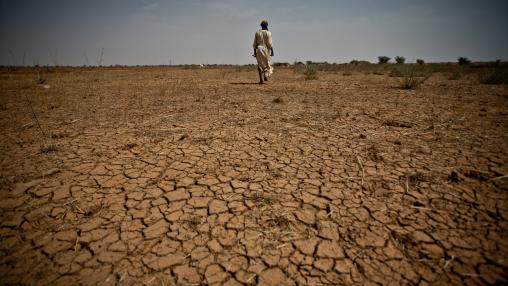
How policy can mitigate impacts of COVID-19 in West Africa
By Aminou Arouna, Guillaume Soullier, Patricio Mendez del Villar, and Matty Demo
Introduction
Africa COVID-19 Food Price Monitor
The Food Price Monitor provides daily updates of prices in wholesale and retail markets for a wide range of food products. Alerts refer to price changes from the start of social distancing measures taken because of COVID-19 and are based on a pre-COVID-19 reference price.
FEWS NET Ethiopia Food Security Alert - August 2020
FEWS NET Zimbabwe Food Security Alert - September 2020
Global Report on Food Crises - 2020 September update

Acute Food Insecurity Rising: 2020 GRFC Mid-Year Update
By: Sara Gustafson
In 2019, as many as 135 million people across 55 countries required urgent food, nutrition, and livelihood assistance, according to the 2020 Global Report on Food Crises . This was the highest global number of acutely food-insecure people on record. The GRFC’s mid-year update , released in early October, takes a look at recent data for 26 of those countries (plus Togo) and specifically examines the impacts of the COVID-19 pandemic.

Sharp increase in food insecurity because of COVID-19, says global food crises report update
In 2019, as many as 135 million people across 55 countries required urgent food, nutrition, and livelihood assistance, according to the 2020 Global Report on Food Crises. This was the highest global number of acutely food-insecure people on record. The GRFC’s mid-year update, released last week, takes a look at recent data for 26 of those countries (plus Togo) and specifically examines the impacts of the COVID-19 pandemic.
Enhancing Cross-Border Trade and Food Security through Data and Information
The scale of the pandemic’s expected impact on poverty, food security, nutrition, and the world economy is unprecedented and requires strong and coordinated interventions across both developed and developing countries. Fundamental to the development and implementation of effective and coherent policy responses to COVID-19 that support recovery, rebuilding, and resilience, is the availability of high-quality, up-to-date data. As a result, developing countries, which tend to have weak institutions, limited capacity and resources, are posed to face the pandemic’s most devastating and long-lasting consequences.
To address the challenges and opportunities for improving data, policy responses, and regional coordination in light of the current pandemic and the dire stakes it raises for food security and nutrition, this policy dialogue took a closer look at Eastern and Central Africa sub-region. The theme of this regional policy dialogue was data and information sharing, with a focus on regional cross-border trade of agricultural commodities and inputs and its implications for food security in the midst of the COVID-19 pandemic.
The target audience included, among others, government/ministry representatives, National
Agricultural Research Institutions, private sector, farmers’ organizations, regional and sub-regional research organizations and in-country development partners.
The program was as follows:
Welcome
Moderator: Dr. Teunis van Rheenen, Head of Partnerships and Business Development, IFPRI
Speakers: Dr. Rob Vos, Director, IFPRI and Prof. Jean Jacques Mbonigaba Muhinda, Executive Director, ASARECA
Data and information sharing in COVID-19 times
Presentation by Prof. Jean Jacques Mbonigaba Muhinda, Executive Director, ASARECA
Regional cross-border agricultural trade and the implications of COVID-19
Presentation by Dr. Antoine Bouet, Senior Research Fellow, IFPRI
Panel reflections from national and regional representatives
Presentation by Commissioner Emmanuel Mutahunga, Department of External Trade, Ministry of Trade, Industry and Cooperatives, Uganda
Presentation by Ambassador Kipyego Cheluget, Assistant Secretary General, COMESA
Presentation by Dr. Fadel Ndiame, Deputy President, AGRA
Find the summary report here.

COVID-19 & African agricultural trade and food security
This piece originally appeared on IFPRI.org .
The COVID-19 pandemic has crippled a number of African agricultural exports, while dependency on food imports and lower purchasing power across much of the continent threaten to push millions more into food insecurity and poverty. A Sept. 17 IFPRI policy seminar , organized with the support of USAID, explored the interaction of the pandemic’s macroeconomic and microeconomic effects, and how Africa must grapple with global and regional markets in order to recover economically.
COVID-19 and its Impacts on Childhood Malnutrition and Nutrition-related Mortality
The webinar, with support from the European Commission, presented findings from this global study on COVID-19 and its impact on childhood malnutrition and nutrition-related mortality. A distinguished panel reflected on the implications of these findings for Ethiopia.
Introduction:
- Dr Aregash Samuel, NIPN Coordinator, EPHI/NIPN
- Teunis Van Rheenen, Head of Partnerships & Business Development, IFPRI
Moderator:
- Cornelia van Zyl, Senior Technical and Policy Advisor, IFPRI/NIPN
Presenter:
- Derek Headey, Senior Research Fellow, IFPRI
Panelists:
- Dr Ferew Lemma - Senior Advisor Office of the State Minister (Programs), Federal Ministry of Health
- Dr Sisay Sinamo - Senior Program Manager of the Sequota Declaration Implementation, Federal Program Delivery Unit, Ministry of Health
Find the summary report here.
